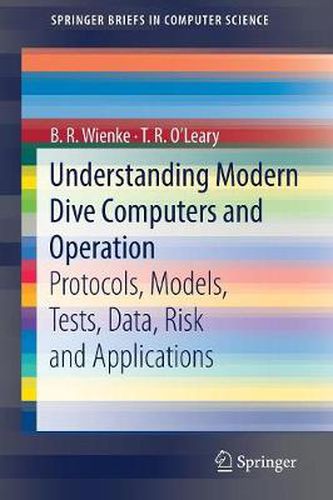Readings Newsletter
Become a Readings Member to make your shopping experience even easier.
Sign in or sign up for free!
You’re not far away from qualifying for FREE standard shipping within Australia
You’ve qualified for FREE standard shipping within Australia
The cart is loading…






This title is printed to order. This book may have been self-published. If so, we cannot guarantee the quality of the content. In the main most books will have gone through the editing process however some may not. We therefore suggest that you be aware of this before ordering this book. If in doubt check either the author or publisher’s details as we are unable to accept any returns unless they are faulty. Please contact us if you have any questions.
This brief provides a complete yet concise description of modern dive computers and their operations to date in one source with coupled applications for added understanding. Basic diving principles are detailed with practical computer implementations. Interrelated topics to diving protocols and operational procedures are included. Tests, statistics and correlations of computer models with data are underscored. The exposition also links phase mechanics to dissolved gases in modern decompression theory with mathematical relationships and equations used in dive computer synthesis. Applications focus upon and mimic dive computer operations within model implementations for added understanding. This comprehensive resource includes a complete list of dive computers that are marketed and their staging models, as well as a complete list of diveware marketed and their staging algorithms, linkage of pertinent wet and dry tests to modern computer algorithms, a description of two basic computer models with all constants and parameters, mathematical ansatz of on-the-fly risk for surfacing at any dive depth, detailing of statistical techniques used to validate dive computers from data, and a description of profile Data Banks for computer dive model correlations. The book will find an audience amongst computer scientists, doctors, underwater researchers, engineers, physical and biosciences diving professionals, explorers, chamber technicians, physiologists and technical and recreational divers.
$9.00 standard shipping within Australia
FREE standard shipping within Australia for orders over $100.00
Express & International shipping calculated at checkout
This title is printed to order. This book may have been self-published. If so, we cannot guarantee the quality of the content. In the main most books will have gone through the editing process however some may not. We therefore suggest that you be aware of this before ordering this book. If in doubt check either the author or publisher’s details as we are unable to accept any returns unless they are faulty. Please contact us if you have any questions.
This brief provides a complete yet concise description of modern dive computers and their operations to date in one source with coupled applications for added understanding. Basic diving principles are detailed with practical computer implementations. Interrelated topics to diving protocols and operational procedures are included. Tests, statistics and correlations of computer models with data are underscored. The exposition also links phase mechanics to dissolved gases in modern decompression theory with mathematical relationships and equations used in dive computer synthesis. Applications focus upon and mimic dive computer operations within model implementations for added understanding. This comprehensive resource includes a complete list of dive computers that are marketed and their staging models, as well as a complete list of diveware marketed and their staging algorithms, linkage of pertinent wet and dry tests to modern computer algorithms, a description of two basic computer models with all constants and parameters, mathematical ansatz of on-the-fly risk for surfacing at any dive depth, detailing of statistical techniques used to validate dive computers from data, and a description of profile Data Banks for computer dive model correlations. The book will find an audience amongst computer scientists, doctors, underwater researchers, engineers, physical and biosciences diving professionals, explorers, chamber technicians, physiologists and technical and recreational divers.